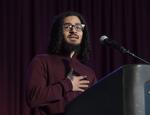A Lancaster city church, prompted by the 2020 murder of George Floyd by a police officer in Minnesota, is collecting donations for a Black reparations fund.
The Reparations Action Fund for Tomorrow looks to “address systemic inequities experienced by African Americans, arising from generations of racial injustice in our community,” according to a description of the fund on the Lancaster County Community Foundation’s website. The foundation provides administrative support services for the fund, including a space for meetings and a webpage at lanc.news/RAFFT where people can donate to the fund or apply for grants.
“It’s so obvious wealth has been able to increase exponentially for white people for centuries, but not for Blacks,” said Susan Gascho-Cooke, pastor of congregational care at Community Mennonite Church.
The idea for the fund, which was established in June 2024, emerged from group discussions involving nearly 120 of the church’s members. The church has a membership of about 350 people.
“This local reparations fund isn’t even radical,” said Gascho-Cooke, who is white. “It’s just a humble start to put something into motion on a small level instead of waiting and doing nothing until national reparations take place.”
Gascho-Cooke said the church’s journey toward creating the fund was spurred by the death of Floyd, a Black man killed by a white police officer on May 25, 2020, while in custody in Minneapolis. Members of the 332 W. Orange St. predominantly white church began researching and discussing the effects of slavery and injustices committed against Black people, followed by a discernment process to right the wrongs.
“This has been hard work, but it gave us an opportunity to find ways to do something about it. There was a strong feeling about making a change in the world and changing ourselves,” Gascho-Cooke said. “In Christianity we would call that a movement of the spirit. It felt like a shared sense of seeing something and feeling urgency together.”
The Rev. Roland Forbes, senior pastor of Ebenezer Baptist Church, a predominantly Black congregation in Lancaster city, said the fund is a big effort on behalf of Community Mennonite Church.
“It pushes the conversation about slavery and reparations to the forefront, and it allows for there to be dialogues in terms of reparations,” Forbes said.
A work in progress
The Reparations Action Fund for Tomorrow aims to address the harm done to African Americans in Lancaster County through happenings outside of their control, according to Marty Kelley, chairperson of the church’s Dismantling Racism Committee.
“We have to think about the opportunities we have had as white people that others have not,” Kelley said. “The hope of RAFFT is that churches will begin the support of reparations to local African Americans in Lancaster County, and systems of racism will be identified and addressed.”
The fund, which has accumulated more than $35,000 to date, has a disbursement team made up of local African American leaders who will determine how the money will be distributed.
“I was very pleasantly surprised and appreciative that (Community Mennonite Church) had that kind of thought process and is helping people to understand existence and levels of racism and oppression that exist in our society,” said the fund’s Disbursement Committee chairperson Deborah Wilson-Gadsden, who is a licensed child welfare social worker and advocate at Washington, D.C.-based Child Welfare League of America.
None of the money has been disbursed from the fund because the Disbursement Committee is still in the process of establishing its charter, according to an email from the committee.
“Once the groundwork is in place, we will announce the details and timeline for disbursement,” the email states.
A timeline for the charter and the eligibility requirements also has not been finalized.
“We are not yet able to provide specific criteria for eligibility or the types of projects that can request funding, but we will make this information public once we begin the disbursement process,” the email states.
Requests for information about the fund can be sent to rafftlanc@gmail.com.
While acknowledging that Community Mennonite and other churches have donated to the fund, the Disbursement Committee wrote, “… the complete details of the sources and donation amounts are not being disclosed yet.”
Other churches that contributed to the fund include Blossom Hill, East Chestnut Street, Landisville and Pilgrims Mennonite churches. The Lancaster Friends Quaker Healing Racism Work Group also contributed.
Lecture on reparations
Yasser Payne, an associate professor of sociology and criminal justice at the University of Delaware’s Department of Africana Studies, said local communities can work to bring awareness about what reparations are, adding they are a system of compensation for harm caused by slavery and racial discrimination.
“That’s going to involve politicians, academia and everyday people,” Payne said earlier this month. “And depending on what the community is interested in, the work can take many different forms. What’s happening in Lancaster is unique in the sense that it’s not a government initiative but something that has religious grounding in terms of the institution that started it.”
Payne was the featured speaker at a Feb. 27 lecture at Millersville University that looked at the concept of reparations and remedies for human rights violations committed against Black people.
The lecture was organized after MU professor Caleb Corkery, who coordinates the Carter G. Woodson Lecture Series at the school, learned about the reparations fund at a meeting of the Lancaster Quaker Friends.
“It seemed like a worthy effort to highlight,” said Corkery, who teaches English and African American studies at MU. “It also says something about our community that people are moving in a direction that’s not gaining traction right now.”
During the February lecture, Payne said cash payments are at the heart of all reparations, and that as far as eligibility, there are groups at the national level who say reparations should be limited to the period of enslavement in the United States between 1615 and 1865. He said others support reparations for the multi-generations of Blacks who have struggled due to racial injustices.
“In most cases local initiatives don’t have the resources to issue cash payments to every Black American, not at the scale that the government would, so only the federal government can do that, and it has been pretty much established in the national reparations movement,” Payne said at the lecture, which was attended by more than 100 people.
Two African American residents in Lancaster city – Darlene Byrd and Derek Smith – also spoke at the MU lecture as part of the panel.
“Some think money will solve racial inequality,” said Byrd, expressing the views of some residents of southeast Lancaster city, where she is president of the nonprofit neighborhood group South Ann Concerned Neighbors. “Others think that funds should be made available to the Black community for housing, acquiring property, counseling, mental health, education, Black foster children and Black women-owned businesses.”
Smith, who is founder and president of the African American Cultural Alliance of Lancaster, emphasized the importance of Black people having the power and resources to organize, lead and address issues on their own rather than relying on white organizations or others to do the work on their behalf.
“Reparations aren’t just about monetary restitution for past wrongs, but also about providing the tools and means for Black communities to shape their own destinies,” Smith said. “It’s about the larger need for empowerment, creating systems and structures that are driven by and serve the needs of Black communities directly.”



![Black business owners in Lancaster County reflect on obstacles, creating path for others [photos, video]](https://bloximages.newyork1.vip.townnews.com/lancasteronline.com/content/tncms/assets/v3/editorial/6/f0/6f016236-e7cd-11ef-9d08-f3c552a58a6c/67aa2b7acf15e.image.jpg?resize=150%2C110)

![SACA completes $100,000 renovation project at drug and alcohol rehabilitation facility [photos]](https://bloximages.newyork1.vip.townnews.com/lancasteronline.com/content/tncms/assets/v3/editorial/4/3e/43e70c4c-ff3b-11ef-8f1f-530f865d4fe8/67d17a2be0afd.image.jpg?resize=150%2C100)

